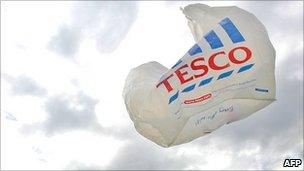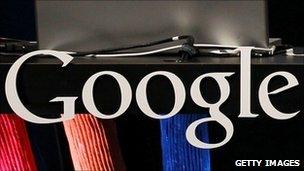How big firms bash their rivals, in public and private
- Published

Facebook's dispute with Google is unlikely to hit the courts, lawyers believe
Facebook's campaign to plant negative stories about Google is not the first such behind-the-scenes tactic employed by a major firm, and it is unlikely to be the last.
In the quest to gain a competitive edge over rivals, many a company has resorted to what have been perceived as underhand methods, with damaging consequences for its image when the truth emerged.
At the same time, other businesses have done well out of publicly knocking their rivals, proving that the right kind of negative campaigning can pay dividends.
A classic example of this kind of "knocking copy" in advertising is seen in Apple's "I'm a Mac/I'm a PC" TV commercials, starring comedians David Mitchell and Robert Webb in the UK version.
Ads of this kind used to be rare in the UK until the mid-1990s, mainly because ambiguously framed laws made it difficult to know whether identifying a rival firm in a commercial was a trade mark infringement.
Now they are all over the place, with supermarket chains merrily attacking each other, each keen to be seen to offer the lowest prices.
Sock puppetry
This sort of campaign carries its own risks, as Tesco found out last month when it cut back its Price Check offer to refund double the difference on products bought for less in Asda, after people "misused" the scheme to make money.
But at least that kind of negative advertising is open and above board. It's much harder to defend the actions of firms that try to deceive the consumer by disguising their own propaganda as the voice of the people.

Tesco's anti-Asda campaign proved a costly one
Unfortunately, the internet lends itself quite readily to such subterfuge, and it has even spawned its own vocabulary to describe the practice.
"Astroturfing" means using websites and blogs to stage what look like grass-roots campaigns, but which are, in fact, wholly artificial.
"Sock puppetry" is what ensues when company stooges post multiple entries under assumed names, posing as members of the public, in order to boost the apparent popularity of a product.
L'Oreal, Wal-Mart and Sony have all in the past produced bogus blogs that purported to be written by ordinary people, but were really the creation of advertising agencies or other company spin-doctors.
'Dirty tricks'
However, none of those fake blogs, or "flogs", specifically targeted other companies - and in any case, such tricks are now outlawed in the EU under the Directive on Unfair Business-to-Consumer Commercial Practices.
In fact, the most devastating example in the UK of one firm using unfair methods to undermine a rival actually pre-dates the internet era.
In 1993, British Airways was forced to apologise in the High Court for what Virgin Atlantic described as a "dirty tricks" campaign against it.

BA and Virgin's rivalry goes back many years
The dispute had begun in July 1991, when Virgin moved the centre of its operations from Heathrow airport to Gatwick, in direct competition with BA.
Virgin boss Richard Branson subsequently accumulated evidence of BA employees poaching Virgin customers and tampering with confidential company files.
He also alleged that BA's PR consultant, Brian Basham, had been undermining him and his company's reputation in the City and the media.
Mr Branson launched a libel action and was then counter-sued by BA and its chairman, Lord King. After a protracted legal battle, BA agreed to pay damages of £500,000 to Mr Branson and £110,000 to his airline, as well as incurring legal costs of up to £3m.
'Aggressive' tactics
In the view of lawyer Alex Fox, partner at Manches, the Facebook-Google dispute is unlikely to spark the same kind of all-out legal action.
"It's very unusual for it to go that far," he told the BBC. "That case was very much driven by personalities."

Google's Social Circle service has prompted Facebook to fight back
If Google wanted to go to the courts, he said, it might potentially be able to claim damages for loss of profit if traffic to Google's site diminished as a result of the allegations.
Otherwise, he said, it was simply another example of "aggressive corporate activities within the marketplace".
And in a similar vein, some people see the whole dispute as a lot of fuss about nothing.
Facebook's campaign came to light after a technology blogger published his e-mail exchange with PR firm Burson-Marsteller, which had been hired by the social networking site to "raise privacy concerns" about Google.
But as Richard Hillgrove, owner of Hillgrove PR, points out, public relations companies have always used such techniques.
'Negative' strategy
"I think people forget that business is war and the most competitive medium right now is social media," Mr Hillgrove told the BBC.
"This is a very deliberate negative PR strategy, but purely in response to Google launching its own social media strategy.
"Should Facebook sit back and watch? No, they're going to fight back and point out why Google is not up to the same standard as Facebook.
"There's nothing that's been said that's not already in the public domain. This is far from being dirty tricks PR."
Whatever the merits of that argument, Facebook has certainly been forced on to the defensive over the affair, saying that the issues were "serious" and should have been presented "in a serious and transparent way".
Clearly this fierce struggle for online dominance is fuelled by some strong commercial imperatives - and the battle between the two firms is unlikely to end soon.
- Published28 April 2011
- Published24 February 2011